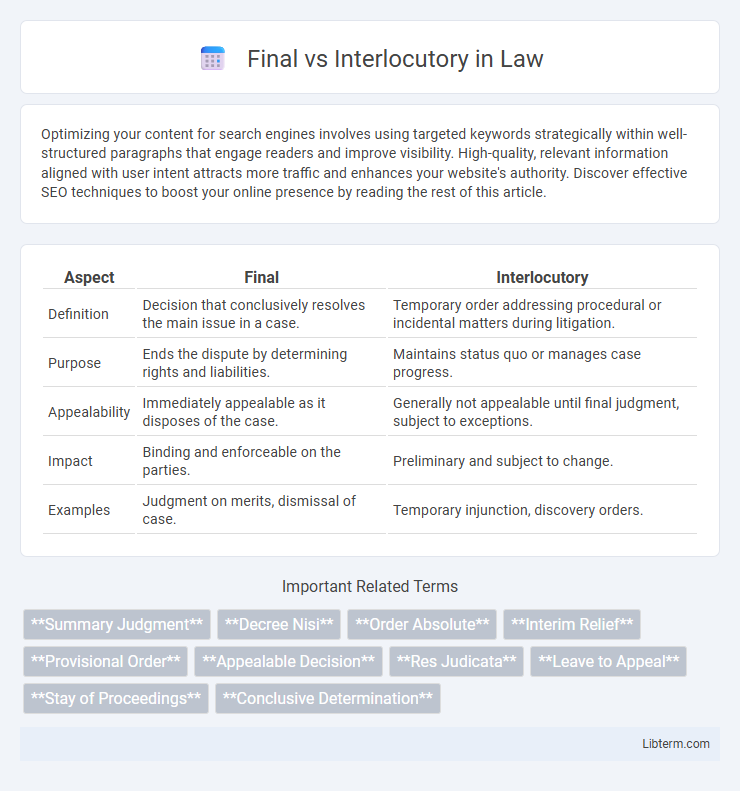Optimizing your content for search engines involves using targeted keywords strategically within well-structured paragraphs that engage readers and improve visibility. High-quality, relevant information aligned with user intent attracts more traffic and enhances your website's authority. Discover effective SEO techniques to boost your online presence by reading the rest of this article.
Table of Comparison
| Aspect | Final | Interlocutory |
|---|---|---|
| Definition | Decision that conclusively resolves the main issue in a case. | Temporary order addressing procedural or incidental matters during litigation. |
| Purpose | Ends the dispute by determining rights and liabilities. | Maintains status quo or manages case progress. |
| Appealability | Immediately appealable as it disposes of the case. | Generally not appealable until final judgment, subject to exceptions. |
| Impact | Binding and enforceable on the parties. | Preliminary and subject to change. |
| Examples | Judgment on merits, dismissal of case. | Temporary injunction, discovery orders. |
Understanding Final and Interlocutory Orders
Final orders conclude the litigation on the merits, resolving all claims and leaving nothing for further judicial action, thereby enabling parties to appeal the decision. Interlocutory orders address preliminary or procedural matters during ongoing litigation without resolving the entire case, often guiding the process toward a final judgment. Understanding the distinction is crucial for determining appealability and the appropriate timing of legal challenges.
Definition of a Final Order
A final order is a definitive ruling by a court that resolves all issues in a case, leaving no matter pending for future determination. It conclusively determines the rights and liabilities of the parties involved, permitting an appeal to higher courts. Unlike interlocutory orders, which address preliminary or procedural matters, final orders signify the termination of litigation at the trial court level.
Definition of an Interlocutory Order
An interlocutory order is a temporary or provisional court ruling made during the course of litigation, which does not finally determine the rights of the parties involved. It addresses procedural or interim issues, such as injunctions, bail, or discovery disputes, and remains effective until the final judgment is rendered. Unlike a final order, an interlocutory order is typically not appealable immediately, as it does not conclude the litigation or resolve the main controversy.
Key Differences Between Final and Interlocutory Orders
Final orders conclude the litigation process by resolving all issues and determining the rights and liabilities of the parties, making them immediately enforceable and appealable. Interlocutory orders, on the other hand, address preliminary or procedural matters within ongoing litigation, such as injunctions or temporary relief, and are generally not immediately appealable except under specific circumstances. The key difference lies in their impact on the case's resolution: final orders end the case, while interlocutory orders manage intermediate steps without disposing of the entire matter.
Legal Significance of Final Orders
Final orders mark the conclusion of litigation on the merits, granting definitive relief and resolving all issues between parties, making them immediately appealable under appellate jurisdiction rules. Interlocutory orders, by contrast, address preliminary or procedural matters without disposing of the entire case, generally remaining non-appealable to avoid undue delays in trial proceedings. The legal significance of final orders lies in their binding effect, as they establish the parties' rights and serve as res judicata, preventing re-litigation of the same issues.
Legal Implications of Interlocutory Orders
Interlocutory orders, issued during the pendency of litigation, have significant legal implications as they can affect the rights and obligations of parties without concluding the entire case. These orders often address procedural matters, preserve the status quo, or provide temporary relief, influencing the course of the trial and potential settlement outcomes. Unlike final orders, interlocutory orders are generally not immediately appealable, which can impact strategic litigation decisions and delay ultimate resolution.
Appeals: Final vs Interlocutory Orders
Appeals from final orders involve judicial decisions that conclude the litigation on the merits, providing a conclusive resolution to the parties' rights and obligations. Interlocutory orders, by contrast, are interim rulings issued during the pendency of a case, which generally are not immediately appealable unless they meet specific exceptions such as controlling questions of law or irreparable harm. Courts typically require appeals from interlocutory orders to promote judicial efficiency and prevent piecemeal litigation, reserving appellate review for final judgments that fully determine the case's outcome.
Examples of Final and Interlocutory Orders
Final orders include judgments that conclude the entire litigation, such as a court ruling on the merits of a case granting summary judgment or dismissing the case with prejudice. Interlocutory orders involve decisions made during the pendency of litigation without resolving the substantive issues, such as a temporary injunction, a discovery ruling, or an order granting a motion to compel. Examples illustrate the distinction where a final order ends the case while interlocutory orders address procedural or intermediate matters.
Importance in Litigation Process
Final judgments conclude the litigation process by resolving all issues and determining the parties' rights and obligations, enabling enforceability and appeal. Interlocutory orders address preliminary or procedural matters, guiding the progression of the case without deciding its ultimate outcome. Understanding the distinction is crucial for strategic litigation management, as interlocutory orders can significantly influence trial preparation and case resolution timing.
Practical Considerations for Legal Practitioners
Final judgments mark the conclusion of litigation by resolving all issues, allowing legal practitioners to proceed with enforcement or appeals, while interlocutory orders address preliminary or procedural matters during trial, requiring strategic consideration on whether to challenge them immediately or wait for final resolution. Practitioners must assess the impact of interlocutory decisions on case momentum and expenses, carefully balancing the benefits of immediate appeal against potential delays. Mastery of these distinctions enhances case management efficiency and client advising accuracy in litigation strategy.
Final Infographic

 libterm.com
libterm.com